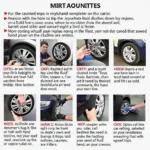Understanding KPMG’s manpower requirements for passenger car service is crucial for businesses seeking to optimize their operations and meet industry standards. This involves not only knowing the number of technicians needed but also the specific skills and qualifications they should possess. This article will delve into the intricacies of staffing a passenger car service center, drawing on KPMG’s expertise and industry best practices.
Understanding the Scope of Passenger Car Service
Passenger car service encompasses a broad range of activities, from routine maintenance like oil changes and tire rotations to more complex repairs such as engine overhauls and transmission replacements. The manpower required depends on the specific services offered, the volume of vehicles serviced, and the complexity of the repairs undertaken. KPMG, a global leader in professional services, provides valuable insights into workforce planning and optimization, helping businesses navigate these complexities.
Defining KPMG’s Role in Manpower Planning
KPMG assists businesses in determining the optimal manpower requirements based on several factors, including market demand, service capacity, and technological advancements. They offer data-driven solutions and industry benchmarks to help companies make informed decisions about staffing their passenger car service centers.
Key Factors Influencing Manpower Requirements
Several factors influence the manpower requirements for passenger car service. These include the range of services offered, the volume of vehicles handled, the level of technology used, and the skillset of the technicians. KPMG’s expertise helps businesses analyze these factors and determine the optimal staffing levels. For example, a service center specializing in high-end vehicles with advanced technology will require more specialized technicians than a general repair shop. Similarly, a high-volume service center will need a larger workforce to manage the increased workload.
Skillset and Qualifications: Beyond the Numbers
While knowing the number of technicians required is essential, understanding the specific skills and qualifications needed is equally important. KPMG emphasizes the importance of a skilled workforce in delivering high-quality service and maintaining customer satisfaction.
Essential Skills for Passenger Car Service Technicians
Modern passenger cars are increasingly complex, incorporating advanced electronics and computer systems. Technicians need to be proficient in diagnostics, electronics, and software programming, in addition to traditional mechanical skills. KPMG’s insights into the evolving automotive landscape help businesses identify the necessary skills and develop training programs to upskill their workforce.
The Importance of Continuous Training and Development
The automotive industry is constantly evolving, with new technologies and innovations emerging regularly. Continuous training and development are crucial for technicians to stay abreast of these changes and maintain their competency. KPMG helps businesses develop comprehensive training programs that equip their workforce with the necessary skills and knowledge to service modern vehicles.
Optimizing Manpower for Efficiency and Profitability
Efficient manpower management is key to maximizing productivity and profitability. KPMG helps businesses optimize their workforce by implementing effective scheduling, performance management, and training programs. This ensures that the right people with the right skills are available at the right time.
Leveraging Technology to Enhance Efficiency
Technology plays a vital role in optimizing manpower in passenger car service. Diagnostic software, automated tools, and digital workflow management systems can streamline operations and improve efficiency. KPMG advises businesses on leveraging technology to enhance productivity and reduce downtime.
Creating a Positive Work Environment
A positive work environment is crucial for attracting and retaining skilled technicians. KPMG emphasizes the importance of creating a culture of respect, collaboration, and professional development to foster employee satisfaction and loyalty.
Conclusion: Meeting the KPMG Manpower Requirement for Passenger Car Service
Meeting KPMG’s manpower requirement for passenger car service involves more than just hiring a sufficient number of technicians. It requires a strategic approach to workforce planning, skill development, and performance management. By focusing on these key areas, businesses can optimize their operations, enhance customer satisfaction, and achieve long-term success in the competitive automotive service industry. Implementing KPMG’s recommendations can significantly impact the profitability and efficiency of a passenger car service business.
FAQ
- What are the key skills required for passenger car service technicians?
- How can technology help optimize manpower in a car service center?
- What is KPMG’s role in manpower planning for the automotive industry?
- Why is continuous training important for car service technicians?
- How can a positive work environment impact employee retention in the automotive sector?
- What factors influence manpower requirements in passenger car service?
- How can businesses ensure they meet KPMG’s standards for manpower in car service?
Need support? Contact us via WhatsApp: +1(641)206-8880, Email: [email protected]. We have a 24/7 customer support team.

